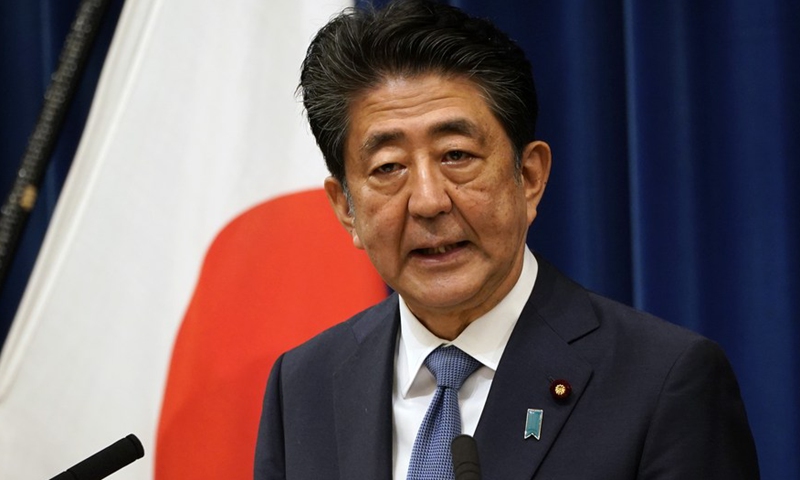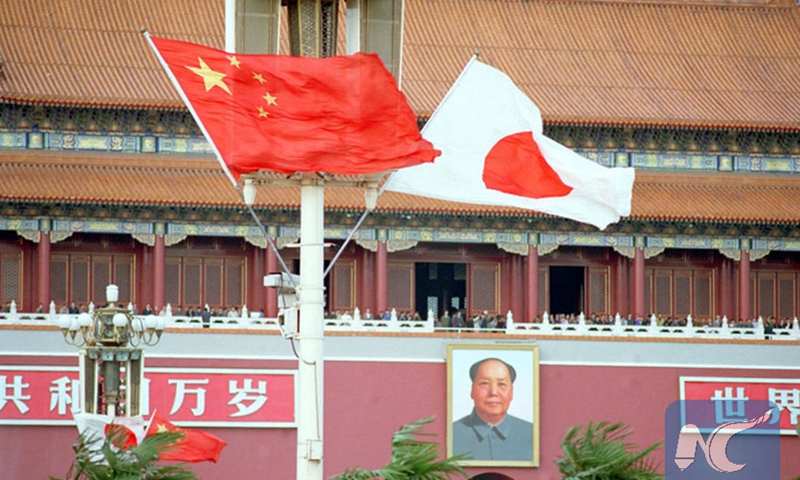Chinese FM spokespersons appreciate Abe’s efforts in improving bilateral relations, wish him recovery
By Zhang Han Source: Global Times Published: 2020/8/29 19:13:10

Japanese Prime Minister Shinzo Abe speaks during a press conference in Tokyo, Japan, Aug. 28, 2020. Photo:Xinhua
After Japan's longest-serving prime minister Shinzo Abe announced his resignation due to health issues, Chinese Foreign Ministry spokespersons Hua Chunying and Zhao Lijian both expressed appreciation for Abe's efforts to improve China-Japan relations and wished him a speedy recovery, the former on her personal Twitter account and the latter in response to a question for the Chinese Foreign Ministry on Saturday.
Analysts interpreted the spokespersons' remarks as high approval of Abe's contributions to building stable and reciprocal relations of the two countries in his two terms, both starting at low points of bilateral ties.
Hua's tweet was sent in both English and Japanese and Zhao, in response to a media inquiry, emphasized Abe's efforts in putting China-Japan relations back on track and a key consensus reached by top leaders of the two countries on promoting bilateral relations to meet the requirements of the new era.
"China is willing to work with Japan to deepen cooperation on pandemic control, economic and social development and further bilateral relations," Zhao noted on Saturday.
Abe, 65, has been Japanese prime minister for nearly eight consecutive years, considered unusual in a country which had six prime ministers in six years before Abe took office in 2012. His first term was 2006-07.

File photo shows national flags of China and Japan. Photo:Xinhua
Before he assumed office again in 2012, China-Japan relations were at one of their lowest points, as the Japanese administration announced the "nationalization" of the Diaoyu Islands, and ties were strained when Abe visited the Yasukuni Shrine in 2013. Relations have gradually improved in recent years, despite some frictions.
Abe, in his first term, chose to visit China first instead of the US upon assuming his position, building up an image of non-hostility to China. It set up the foundation for more room for him to maneuver bilateral relations later on, Chinese analysts said, dubbing him as a "firefighter" in bilateral relations.
Liu Junhong, a research fellow at the China Institute of Contemporary International Relations in Beijing who specializes in Japan issues, told the Global Times on Saturday that normalization of China-Japan relations after the Diaoyu Islands clashes took a long time, and the ice-breaking of political contacts and communications have set a solid basis for non-official exchanges, economically and culturally.
Bilateral relations remained cold in the first two years of Abe's second term but in 2014, leaders of the two countries resumed contact at that year's APEC summit held in Beijing. The two sides continued communications in the following years and in 2018, Abe paid a visit to China, after a seven-year hiatus of a top-level visit.
Abe's resignation will surely bring uncertainty to China-Japan relations, as Japan faces mounting pressure from the US, while also has tight economic bonds with China, Liu said, noting whoever the successor is, Japan should be far-sighted and practical in dealing with its relations with China, as a stable and sound China-Japan relationship can ultimately benefit Japan's own interest.
RELATED ARTICLES:
Posted in: DIPLOMACY